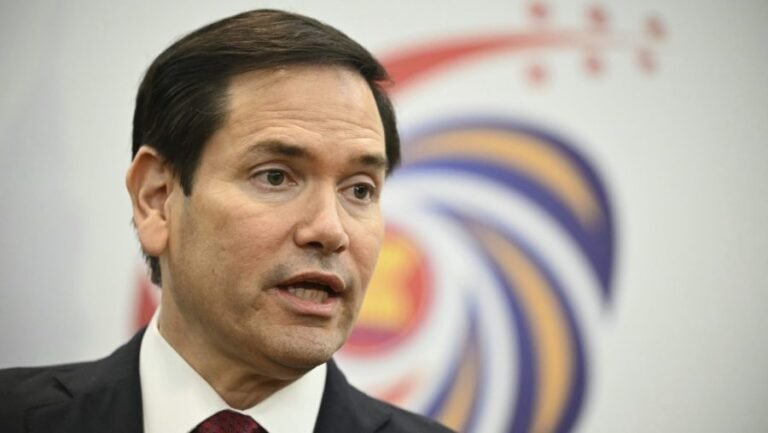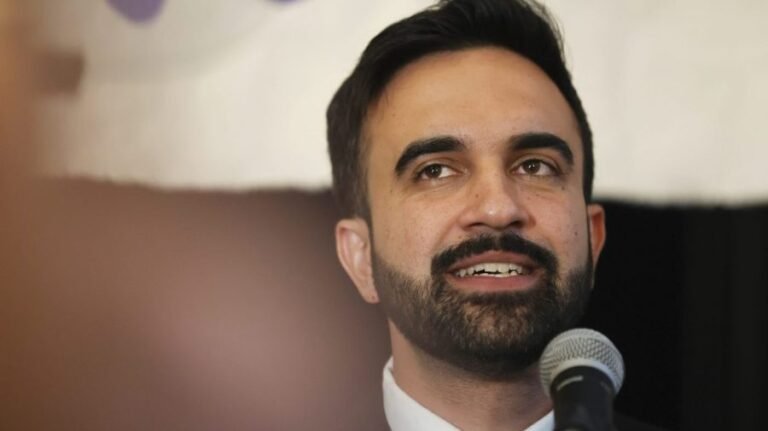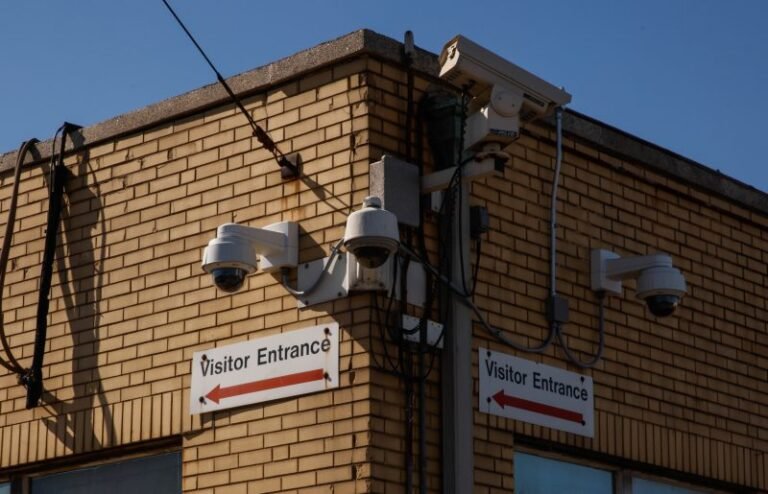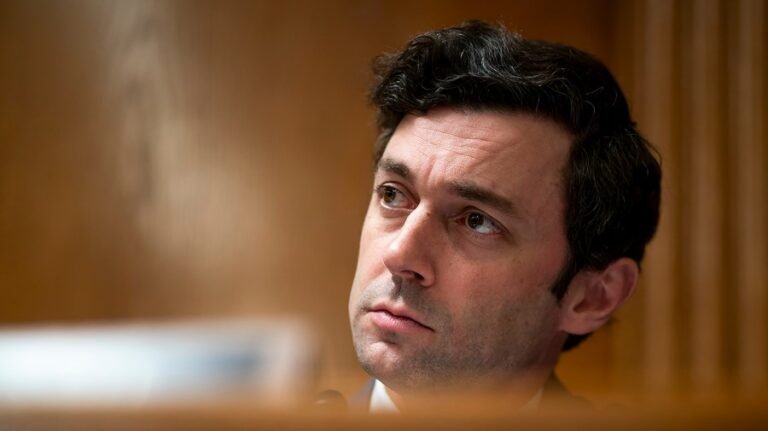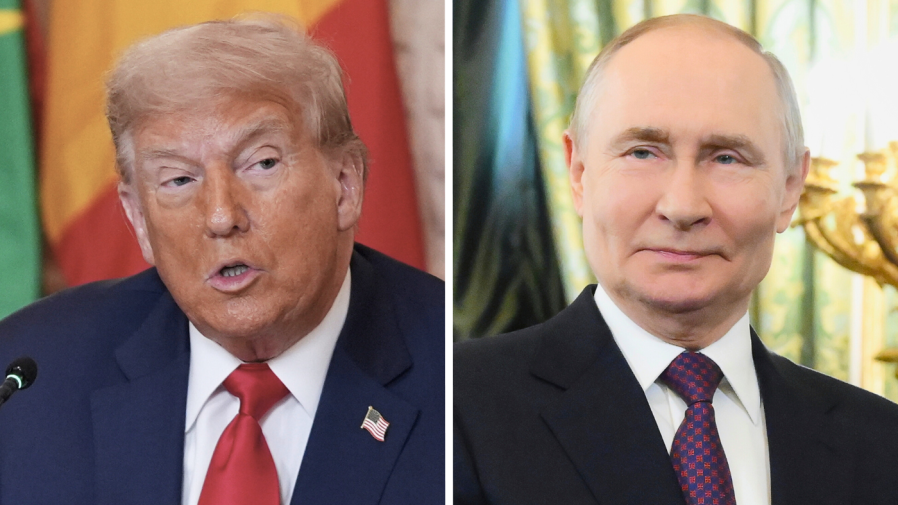
Morning Report is The Hill’s a.m. newsletter. Sign up here or using the box below:
President Trump and Congress are threatening harsh sanctions against Moscow for its three-year war in Ukraine, with Republican lawmakers feeling more confident about passing sanctions legislation this month after Trump sharply criticized Russian President Vladimir Putin this week.
Trump has at times vilified Ukrainian President Volodymyr Zelensky and praised Putin, only to reverse his rhetoric on the two leaders. This week, the president stepped up his criticism of the Russian leader, accusing him of pushing “bulls—” and characterizing his warm words as “meaningless.”
Putin brushed aside Trump’s ramped-up rhetoric and is pushing ahead with renewed intensity in his assault on Ukraine, launching a record drone attack on various regions in the country. The Russian leader is convinced that Moscow’s battlefield superiority is growing, and that Kyiv’s defenses may collapse in the coming months, The New York Times reports.
Zelensky is meeting in Rome today with European politicians, business leaders and American officials for the fourth annual conference on rebuilding Ukraine, seeking to shore up further support from allies.
Back in Washington, Senate Majority Leader John Thune (R-S.D.) said he hopes the Senate passes legislation to place tough sanctions on Russia by the August recess.
The bipartisan proposal is sponsored by Trump ally Sen. Lindsey Graham (R-S.C.) and Sen. Richard Blumenthal (D-Conn.). It would impose primary and secondary sanctions on Russia and countries that purchase Russian oil, gas, uranium and other products, as well as a 500 percent tariff on imported goods from any countries that purchase sanctioned Russian products.
Graham — who said the bill could make it to the floor as early as next week — said the legislation would give Trump “a waiver” to exempt certain imports and exports from sanctions.
“The real focus of the bill is to hit the customers of Putin. China and India buy 70 percent of Russian oil and gas and other petroleum products,” he said. “I’ve always believed the way this war ends is when China goes to Putin and says, ‘Enough already, you’re hurting us now.’”
▪ The Hill: Ukraine’s ambassador to the U.S. is departing at the conclusion of her four-year term as Zelensky looks to reshape relationships in Washington.
▪ Politico: As support builds behind bipartisan sanctions, the White House is seeking changes to the bill that would expand the president’s control.
Over in the House, Speaker Mike Johnson (R-La.) on Wednesday left the door open to holding a vote on the bill. Meanwhile, House Minority Leader Hakeem Jeffries (D-N.Y.) on Wednesday accused Trump’s administration of kowtowing to Putin rather than standing up for Ukraine, suggesting the support for Kyiv is coming too late in the multi-year war.
“There’s strong bipartisan support for sanctions against Vladimir Putin and Russia, and it’s unfortunate that the Trump administration has spent months playing footsie with Vladimir Putin, and some would suggest bending the knee to an enemy of this country,” Jeffries told CNN’s Wolf Blitzer.
Jeffries also pressed Trump to fire Defense Secretary Pete Hegseth after the Pentagon paused some weapons transfers to Ukraine last week amid reviews of U.S. military stockpiles. The block was later lifted at Trump’s direction, and the president said the deliveries were necessary for Kyiv to defend itself.
The backtracking revealed chasms within the White House, The Hill’s Ellen Mitchell reports. Trump said Tuesday he didn’t know who approved the weapons pause, of which CNN reports Hegseth didn’t inform the White House before he authorized it.
The original decision to hold off on the weapons to Kyiv was reportedly largely driven by Pentagon policy chief Elbridge Colby, a close ally to Vice President Vance, and signed off on by Deputy Defense Secretary Stephen Feinberg after it was discovered that the U.S. only has about 25 percent of the Patriot interceptors needed for all Defense Department military plans.
“We’re really starting to see the strains of the limits of the coordination amongst the White House, the Pentagon and the State Department,” said Heather Conley, a senior fellow at the American Enterprise Institute.
▪ The Hill: Sen. Thom Tillis (R-N.C.) said Wednesday he would not vote in favor of Hegseth’s confirmation now.
▪ CNN: Trump said he threatened to bomb Moscow if Putin attacked Ukraine, 2024 fundraiser tapes show.
As tensions ratchet up between Moscow and Washington, Secretary of State Marco Rubio is expected to meet with Russian Foreign Minister Sergey Lavrov in Malaysia today on the sidelines of the Association of Southeast Asian Nations summit.
MEANWHILE: The White House appears to be making progress toward brokering a ceasefire between Israel and Hamas in Gaza.
Senior U.S., Israeli and Qatari officials held talks at the White House on Tuesday that focused on the key remaining sticking point for a long-sought ceasefire and hostage deal in Gaza, Axios reports.
Trump met with Israeli Prime Minister Benjamin Netanyahu twice this week as he presses both Israel and Hamas to finalize a deal. White House envoy Steve Witkoff said Tuesday that the majority of disagreements had been resolved between the parties. BBC reports key sticking points include how aid would be distributed during the ceasefire and Israeli troop withdrawals during the 60-day truce.
Amid the negotiations, Trump and Netanyahu are at a pivotal point in their relationship, write The Hill’s Alex Gangitano and Laura Kelly. Even when the two leaders have diverged in private, they have usually remained publicly in lockstep — apart from Trump dropping an f-bomb last month during the shaky start of the Israel-Iran ceasefire.
▪ The Hill: Rep. Marjorie Taylor Greene (R-Ga.) said Wednesday she will move to stop additional aid to Israel.
▪ The Hill: Rubio accused U.N. Human Rights Council Special Rapporteur Francesca Albanese of leading “political and economic warfare” against the U.S. and Israel.
▪ Haaretz: Netanyahu supports a plan to concentrate the entire population of Gaza in a “humanitarian city” to be established on the ruins of Rafah.
But as Trump turns his attention to ending the fighting in Gaza, Netanyahu risks drawing the president’s ire once again.
“The president gets frustrated because he wants this victory of having brought peace,” said Elliott Abrams, U.S. special representative for Iran during Trump’s first term. “I think when it comes to Gaza, he recognizes that the problem is Hamas. So it’s frustrating to him that he can’t get the hostages out and get a ceasefire, but he’s not blaming Netanyahu.”
SMART TAKE with BLAKE BURMAN
The White House’s battle against Harvard University escalated Wednesday when the Trump administration suggested the elite university might not meet accreditation standards. President Trump said he believed a deal could be reached with the school.
May Mailman, White House senior policy strategist and Harvard Law graduate, told me the ball is in Harvard’s court.
“A deal could happen tomorrow, if all Harvard were to do is agree to a very few things that the administration cares about,” Mailman said Wednesday night. “As far as timing, that is up to Harvard.”
Both the president and the administration are making it publicly known that a “deal” is in reach. I’d watch the next few weeks to see if the two sides actually get closer to one.
3 Things to Know Today
- Six Secret Service agents were suspended without pay or benefits following an internal investigation into actions surrounding the assassination attempt against the president in Butler, Pa., last year.
- The United States recorded the highest number of measles infections since the disease was officially declared eliminated here 25 years ago.
- Home sellers quit the market in frustration this spring when they could not find buyers at their asking price. Delistings climbed nearly 50 percent.
Leading the Day
TRADE: The White House is 88 trade deals short, based on officials’ April estimate that the administration could negotiate 90 country-specific agreements in 90 days.
Trump this week gave his administration an extension to implement a worldwide tariff plan that he says will reverse decades of globalization and usher in a new era of domestic manufacturing. But CEOs, investors and foreign leaders appear skeptical that Trump, who has long viewed tariffs as a statement of power, will stick to a new Aug. 1 deadline.
The president on Wednesday sent at least seven letters threatening U.S. tariffs against countries including Iraq, Libya and the Philippines. He sent letters to 14 countries on Monday detailing higher tariffs to be levied on their goods in the absence of agreements. The letters also indicated he would be open to further negotiation.
▪ The New York Times: With tariffs, deregulation, deportations and tax cuts, Trump has already placed an indelible mark on the U.S. economy.
▪ The Hill: Trump said Wednesday he’ll slap Brazil with a 50 percent tariff as he sought to defend former President Jair Bolsonaro.
NASA: The new interim administrator of NASA is Transportation Secretary Sean Duffy, Trump announced last night. Duffy responded that he was “honored to accept this mission,” adding, “Time to take over space.”
The president last month pulled the nomination of his previous choice to lead the space agency, billionaire private astronaut Jared Isaacman, who was recommended to him by SpaceX CEO and former Department of Government Efficiency adviser Elon Musk, with whom Trump is feuding.
The president recently said he “was surprised to learn that [Isaacman] was a blue blooded Democrat, who had never contributed to a Republican before.” Trump also wrote on Truth Social that Musk’s SpaceX contracts with NASA created an appearance that the choice of Musk’s friend was “inappropriate.”
FEMA: Homeland Security Secretary Kristi Noem, whose department includes the Federal Emergency Management Agency, did not authorize FEMA’s deployment of Urban Search and Rescue teams to the Texas Hill Country until Monday, more than 72 hours after the flooding began, CNN reports.
As a cost-control change, the secretary requires that she grant permission for contracts and grants over $100,000 before funds can be released, which officials warned last month slows emergency response by FEMA.
On Wednesday, Noem said FEMA has been “slower to get the resources to Americans in crisis, and that is why this entire agency needs to be eliminated as it exists today and remade into a responsive agency.”
Trump has suggested states should shoulder more of emergency preparedness and response expenses, but has not shared specific plans for overhauling FEMA.
When and Where
- The president will receive his intelligence briefing at 10:30 a.m.
- The Senate meets at 10 a.m.
- The House is out until Monday.
Elsewhere
MIDTERM STRATEGIES are well underway, which means it’s time to check in on election history and House contests.
Why are Republicans uneasy about the economy, MAGA opinionators and downbeat voter assessments of the GOP’s mammoth “big, beautiful” agenda, now embodied in law? Because the majority party has just 220 House seats, meaning a net loss of just three in next year’s elections could cost them control of the chamber.
Midterm history for parties in power is well known and instructive: In 2022, with a Democrat in the White House, Democrats lost nine House seats. Trump in his first term saw Republicans lose 41 seats in 2018. Former President Obama, following an 18-month pitched battle and then the narrow enactment of the Affordable Care Act, saw Democrats lose 63 seats in 2010. He called it a “shellacking.” Republicans lost 31 seats in 2006 with George W. Bush in the Oval Office.
NBC News political analyst Steve Kornacki published a chart on Tuesday to illustrate those midterm losses stretching back to 1966. He wrote that the GOP may have an ace to play: the unfavorable views of the Democratic Party brand, as measured in recent polls.
Jeffries, with help from Democratic colleagues in the House, has been trying to drive up Republican negatives at the same time he’s leaning on blue-state contests in 2026. Three months ago, the Democratic Congressional Campaign Committee, the political arm for House Democrats, identified 35 Republican-held districts it said are competitive and could help determine the House majority. The Cook Political Report with Amy Walter at the end of June listed 10 “toss up” House races for Democrats and eight “toss up” GOP contests.
FOR AND AGAINST: Jeffries is hammering what he calls the GOP’s “big, ugly” bill, which Trump signed on Friday before the president pivoted back to trade and international conflicts this week. While attacking Republicans’ agenda, the minority leader has been working to assure the public that Democrats have an “affirmative vision for making their life better.”
“Trump and House Republicans … have launched this unprecedented assault on the American way of life and assault on health care,” Jeffries told CNN on Wednesday. “They’re ripping food out of the mouths of children, veterans and seniors. They’re exploding the national debt. They’re unleashing masked agents on law-abiding immigrant communities.”
Jeffries suggests his party can pick up seats and perhaps the majority by concentrating on competitive states led by Democrats. During an MSNBC interview on Tuesday, he pointed to New York, New Jersey, California, Michigan, Wisconsin, Pennsylvania and Arizona — led by Democratic governors, attorneys general and lieutenant governors — as states “that are going to determine in large measure who controls the House.”
The Democratic Party, still in search of a clear leader, has at the national level struggled to find consensus after 2024’s rebuke from voters. Popular governors, some of whom are eyeing the 2028 election season, are viewed as potential powerhouses for midterm messaging, the ground game and fundraising.
▪ The Hill: Republican lawmakers are wary about Musk’s new America Party ahead of the midterms.
▪ The Washington Post: Some Trump decisions trigger MAGA unrest.
WEST COAST MEETS EAST: California Gov. Gavin Newsom (D), who is widely considered to be a leading contender for the Democratic Party’s presidential nomination in 2028, wrapped up a two-day swing through South Carolina on Wednesday. The governor rebuked Trump during his stop in the early primary state, vowing, “we cannot let him win.”
Newsom on Wednesday also told reporters he is skeptical — but not surprised — about the IRS’s decision this week that allows churches to endorse political candidates.
“I don’t know if it’s healthy — I don’t even know it’s legal, but it’s not surprising,” Newsom said. “I just find it politically convenient.”
DEGREES OF SEPARATION: The Education Department and Department of Health and Human Services told Harvard University’s accreditor Wednesday there is “strong evidence to suggest the school may no longer meet” accreditation standards, a threat that places the university’s federal student aid at risk.
The letter to the New England Commission of Higher Education is the latest escalation in the administration’s multifront effort against the well-financed and influential private university. The administration also took aim Wednesday at Harvard’s international students, who until recently made up 27 percent of the school’s enrollment and represented lucrative tuition revenue for the school.
The Department of Homeland Security (DHS) — ratcheting up government pressure Harvard first rejected in April — said it will subpoena the university for “relevant information” about international students, alleging that “Harvard, like other universities, has allowed foreign students to abuse their visa privileges and advocate for violence and terrorism on campus.”
The administration announced earlier this year it would end the foreign student visa program at the university — a battle that has landed in the courts. The administration also moved to freeze more than $3 billion in federal grants and contracts to Harvard.
▪ The New York Times: How Harvard’s ties to China helped make it a White House target.
▪ The Washington Post: To study in the U.S. during Trump’s presidency, international students are scrubbing their social media accounts because they fear new visa-vetting scrutiny beyond their control.
MORE IN CONGRESS: Former President Biden’s personal physician cited doctor-patient privilege and constitutional rights against self-incrimination while declining to answer questions during a deposition with a GOP-led House panel on Wednesday.
Opinion
- The economic drain of mass deportation, by The Wall Street Journal editorial board.
- How trust can boost the U.S.-Mexico fight against narco finance, by Duncan Wood, opinion contributor, The Hill.
The Closer
And finally … It’s Thursday, which means it’s time for this week’s Morning Report Quiz!
Alert to worrisome intrusions by the faux and fabricated, as reported in the recent headlines, we’re eager for some smart guesses about fakes.
Be sure to email your responses to asimendinger@thehill.com and kkarisch@thehill.com — please add “Quiz” to your subject line. Winners who submit correct answers will enjoy some richly deserved newsletter fame on Friday.
Authorities are searching for whoever used artificial intelligence (AI) on Signal to credibly impersonate which top U.S. official? An imposter contacted VIPs in the U.S. and abroad, according to news accounts this week.
1. Vice President Vance
2. Secretary of State Marco Rubio
3. Treasury Department Secretary Scott Bessent
4. Defense Secretary Pete Hegseth
Which lawmaker was prominently the victim in 2019 of a deepfake video maliciously intended to suggest intoxication, which circulated on Facebook and attracted 3 million views?
1. Sen. Chuck Schumer (D-N.Y.)
2. Sen. Mitch McConnell (R-Ky.)
3. Rep. Nancy Pelosi (D-Calif.)
4. Rep. Kevin McCarthy (R-Calif.)
In April, the FBI raided and prosecutors soon indicted a Miami art dealer who allegedly sold faked works represented as the creations of which artist?
1. Andy Warhol
2. Jackson Pollock
3. Bob Ross
4. Banksy
In May, Trump took aim at nonconsensual intimate imagery published online (including deepfakes generated with AI) by signing what?
1. Executive order
2. Federal Communications Commission regulation
3. TAKE IT DOWN Act
4. U.S. complaint through the International Trade Commission
Thanks for reading! Check out more newsletters here. See you next time.
